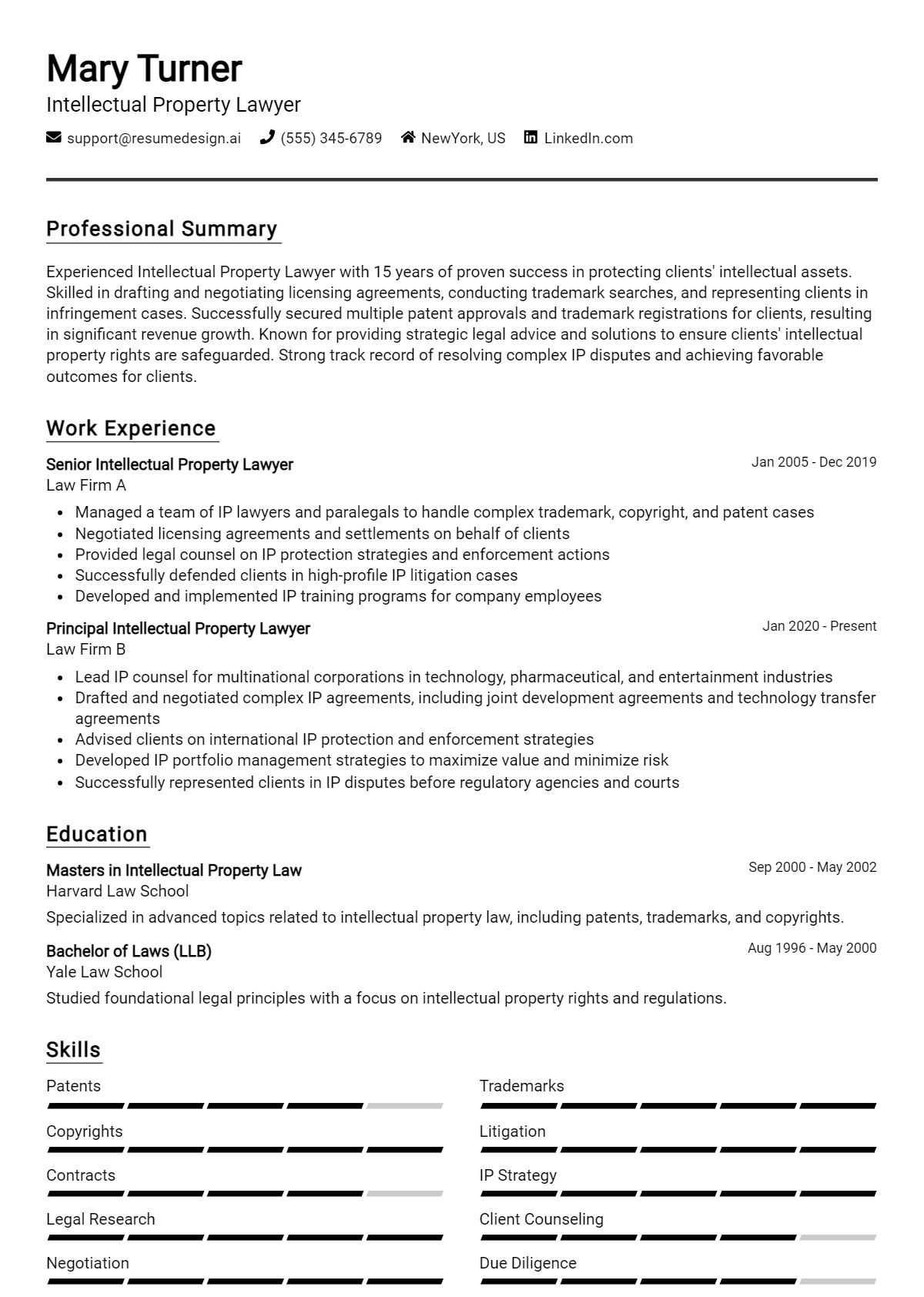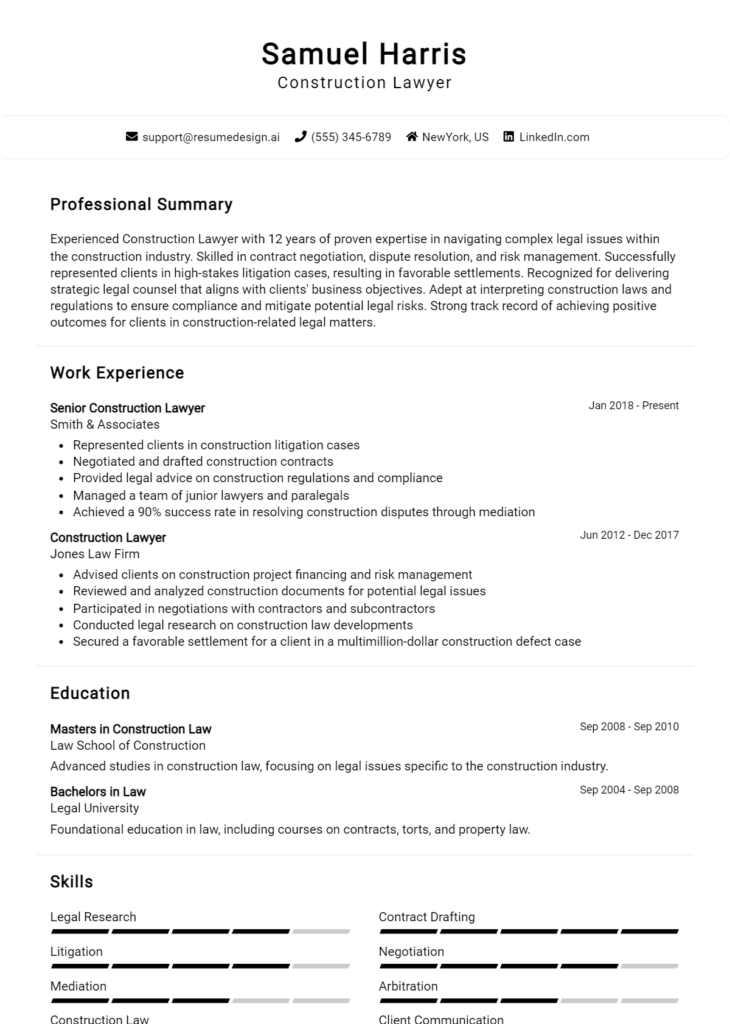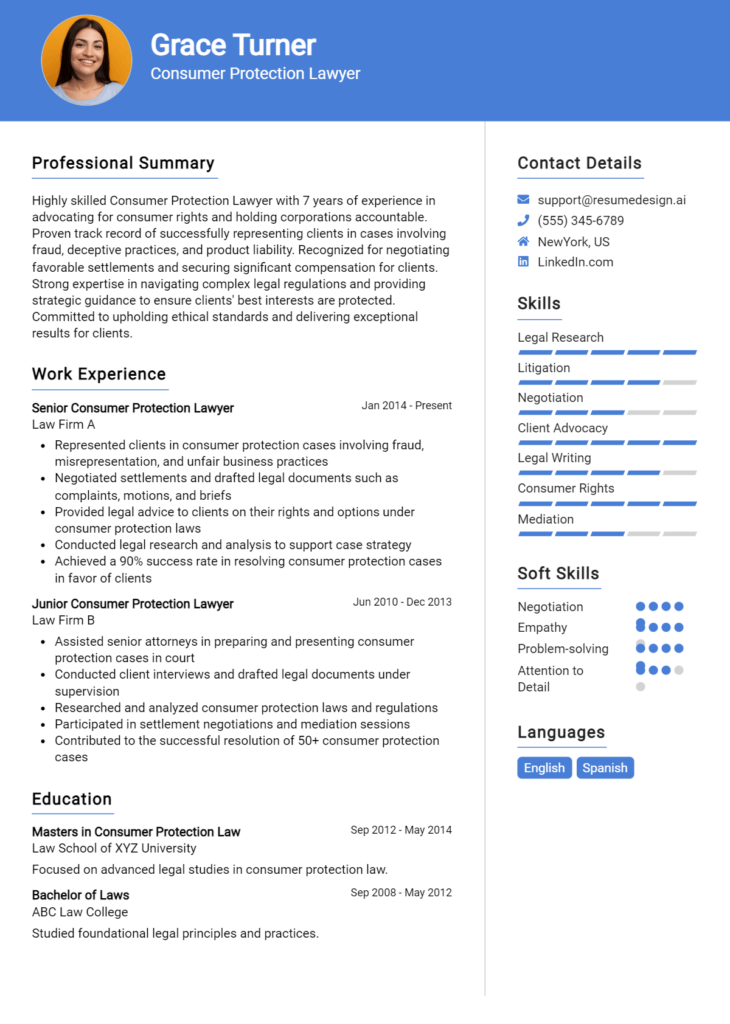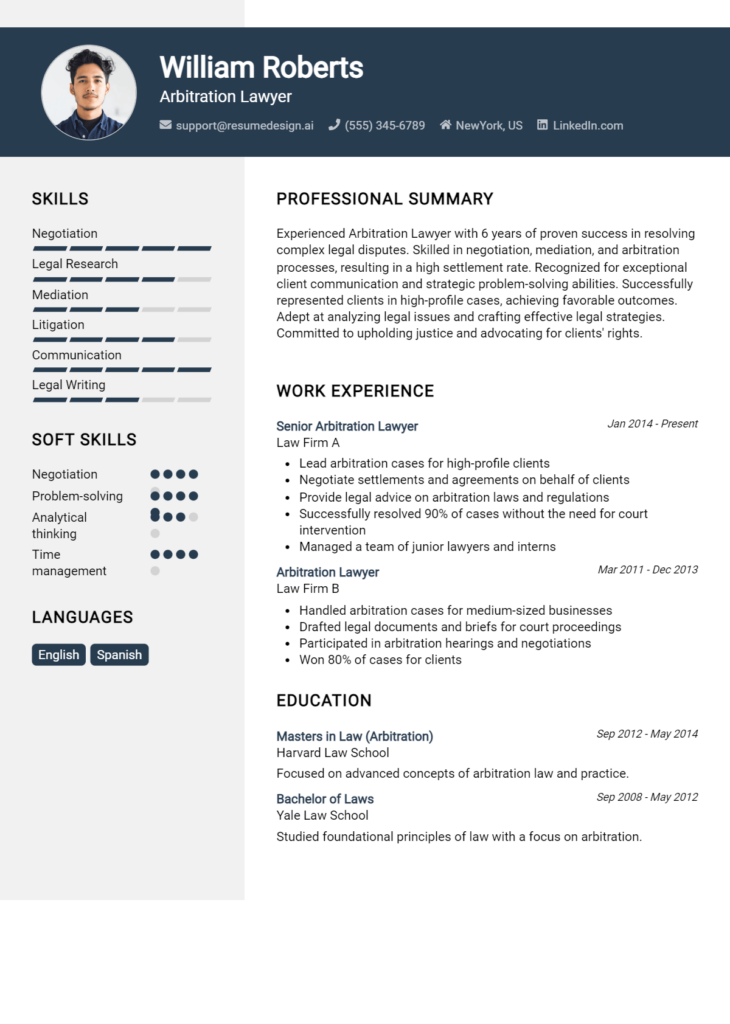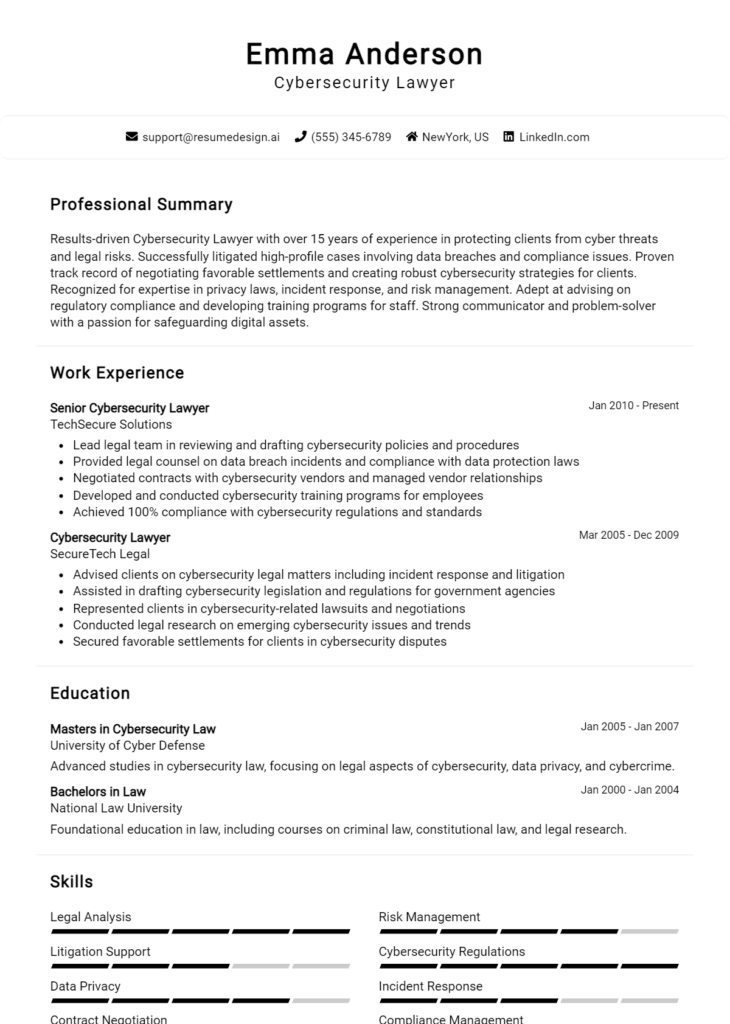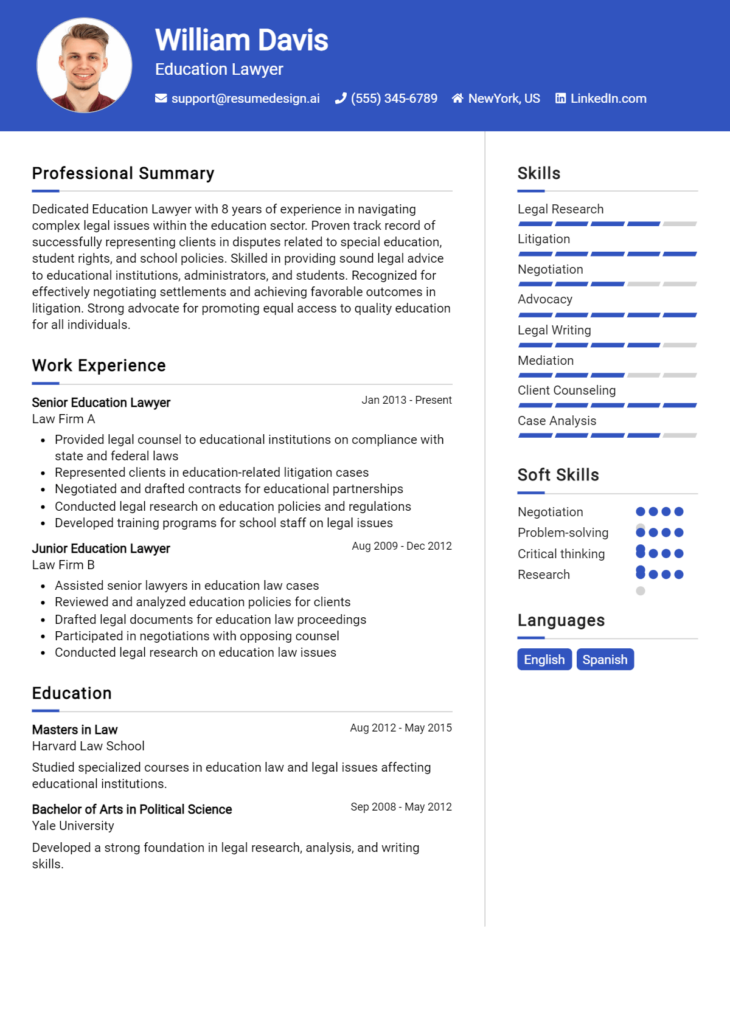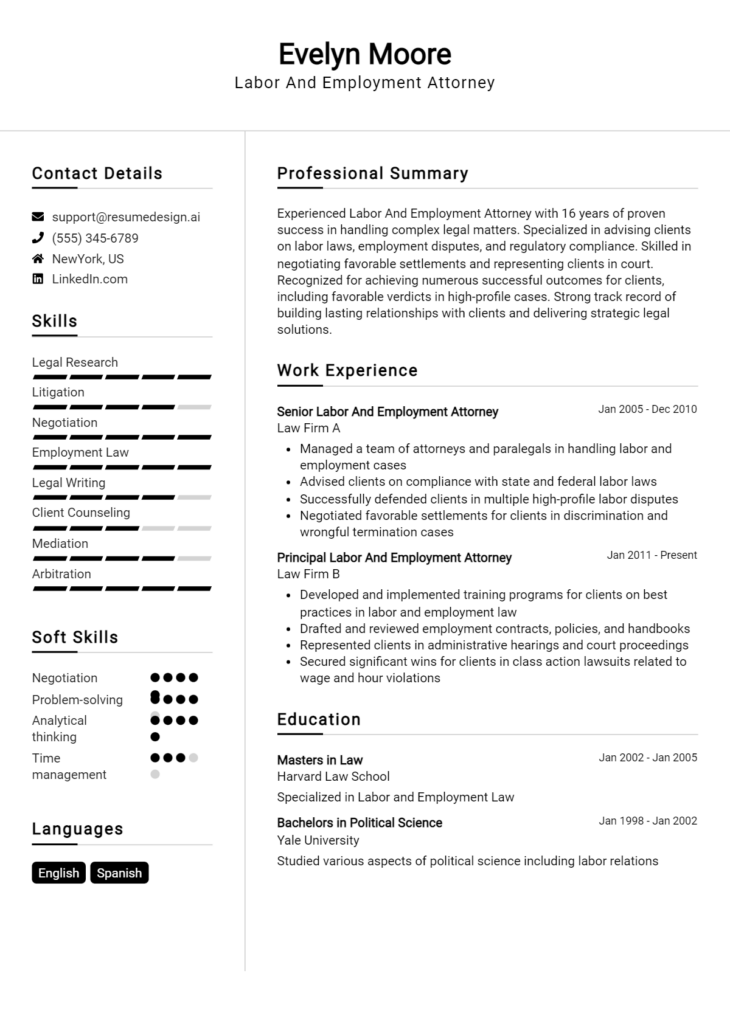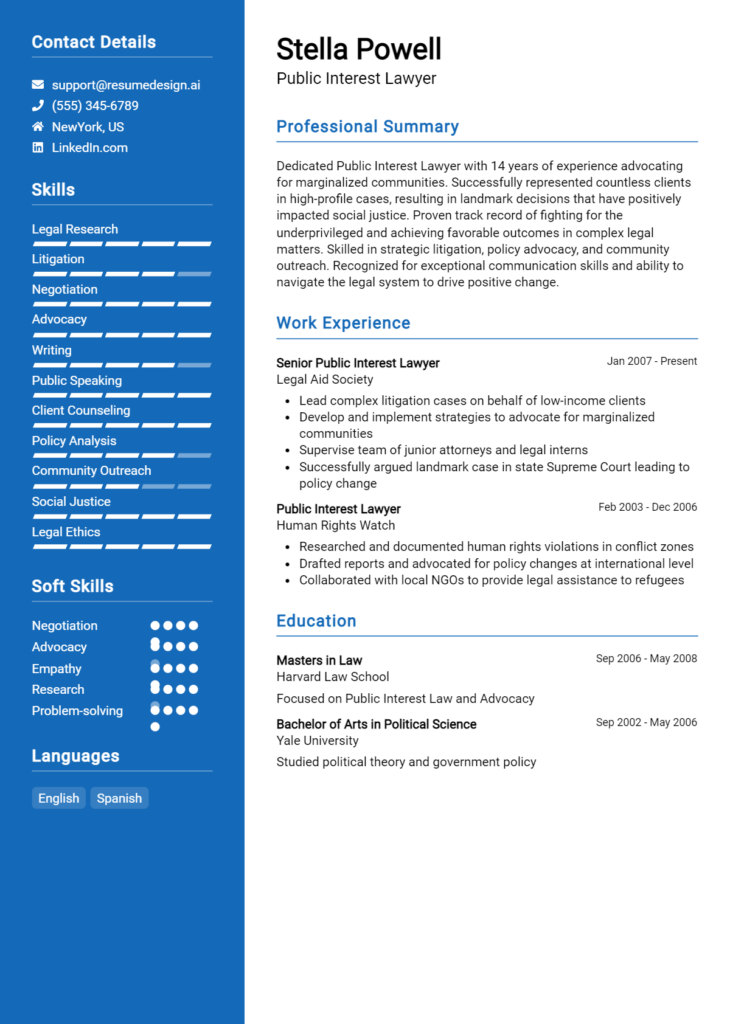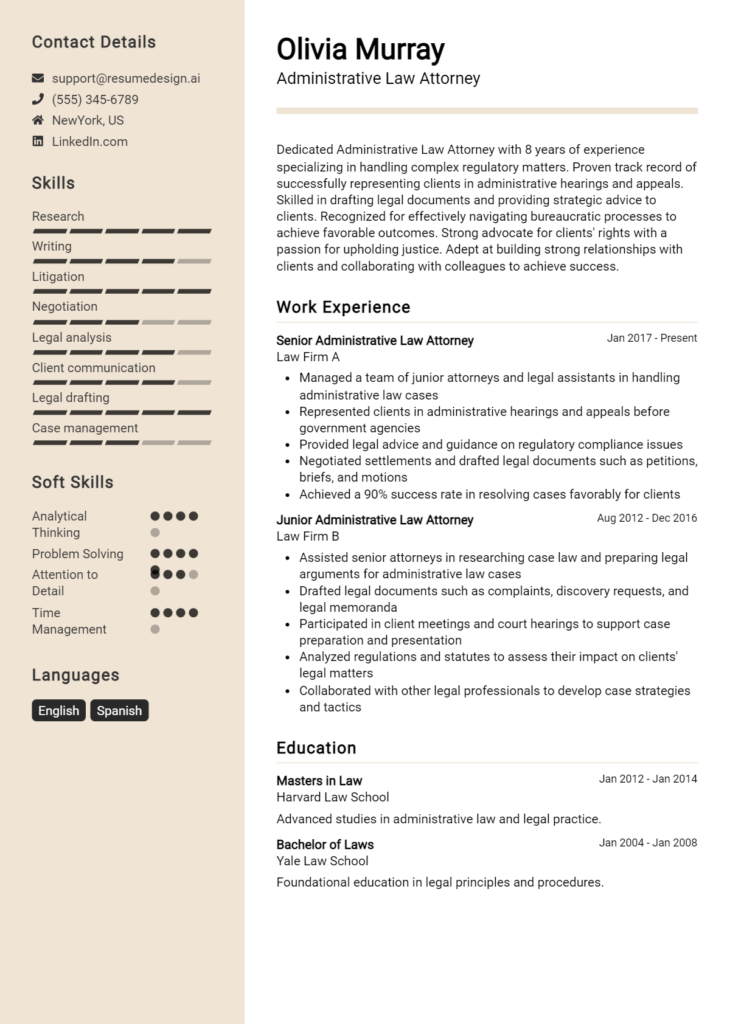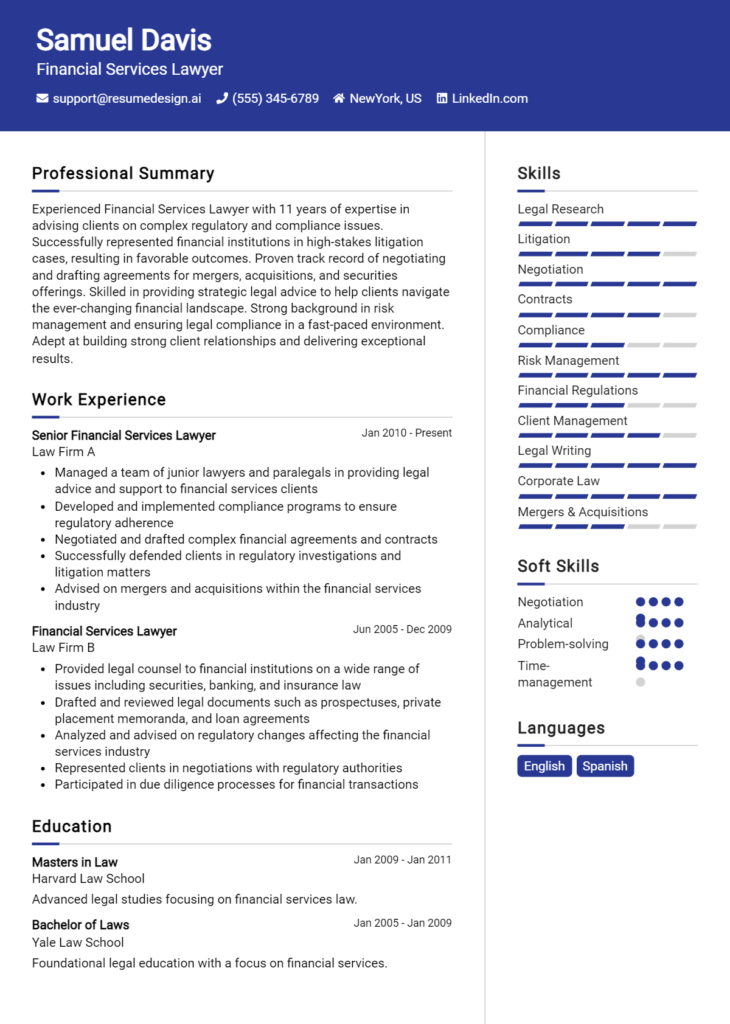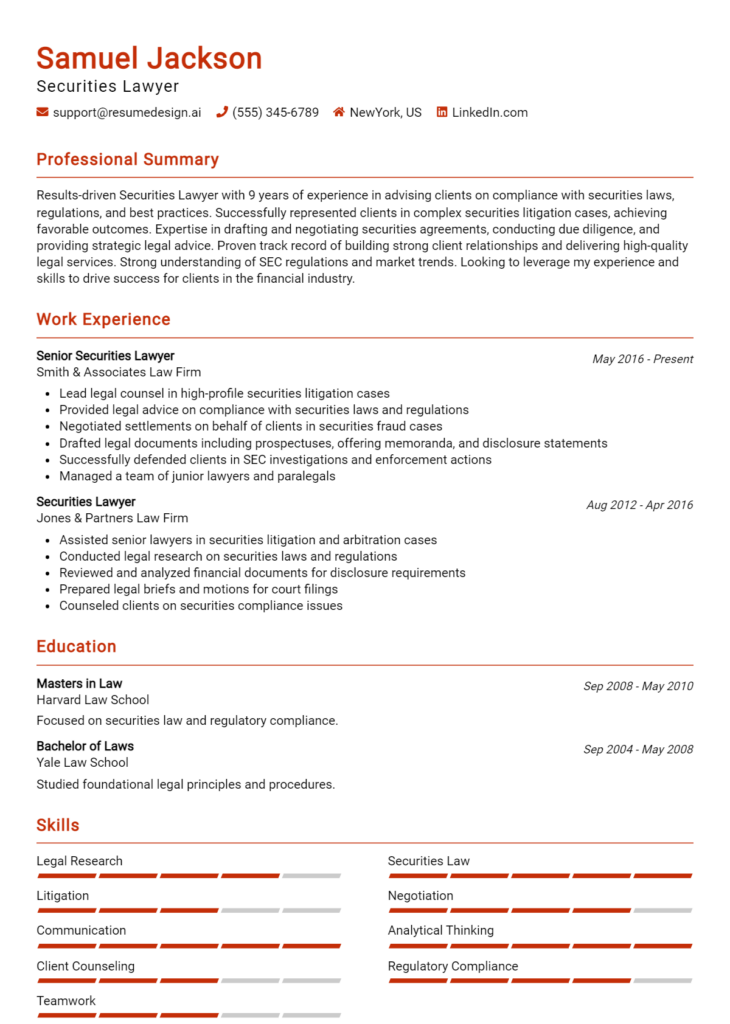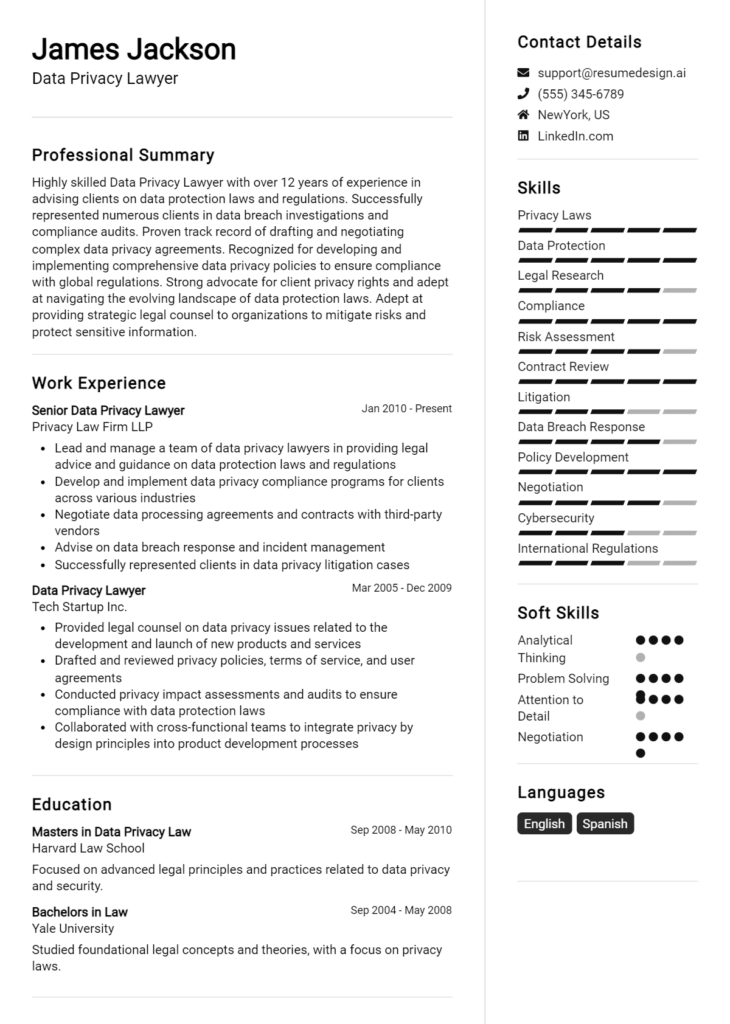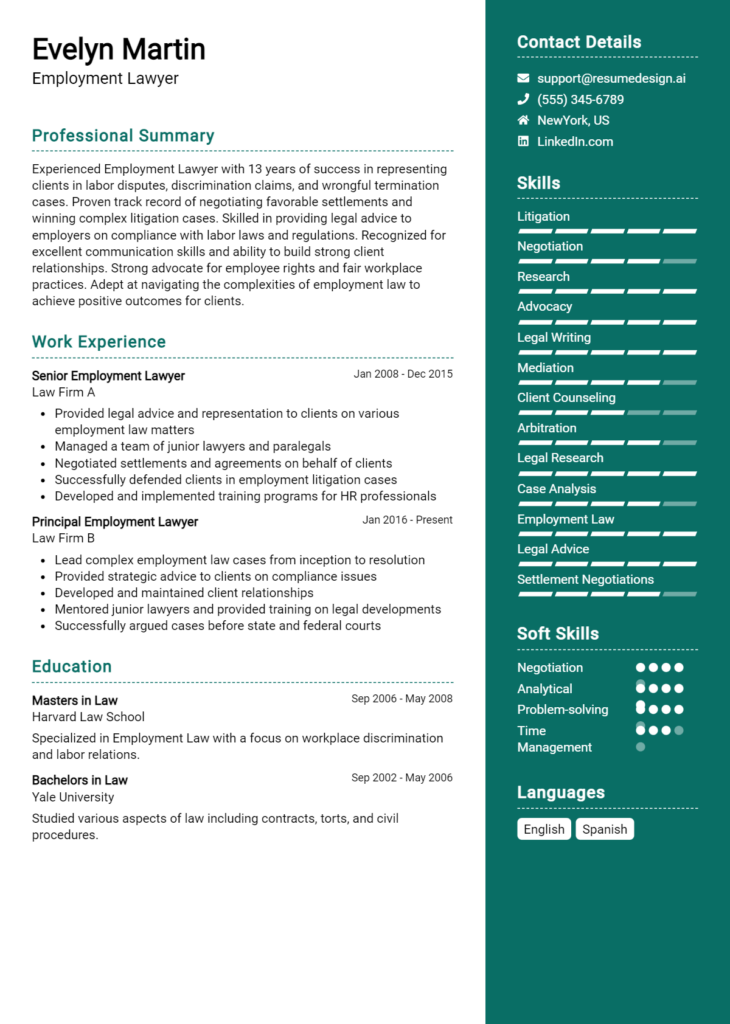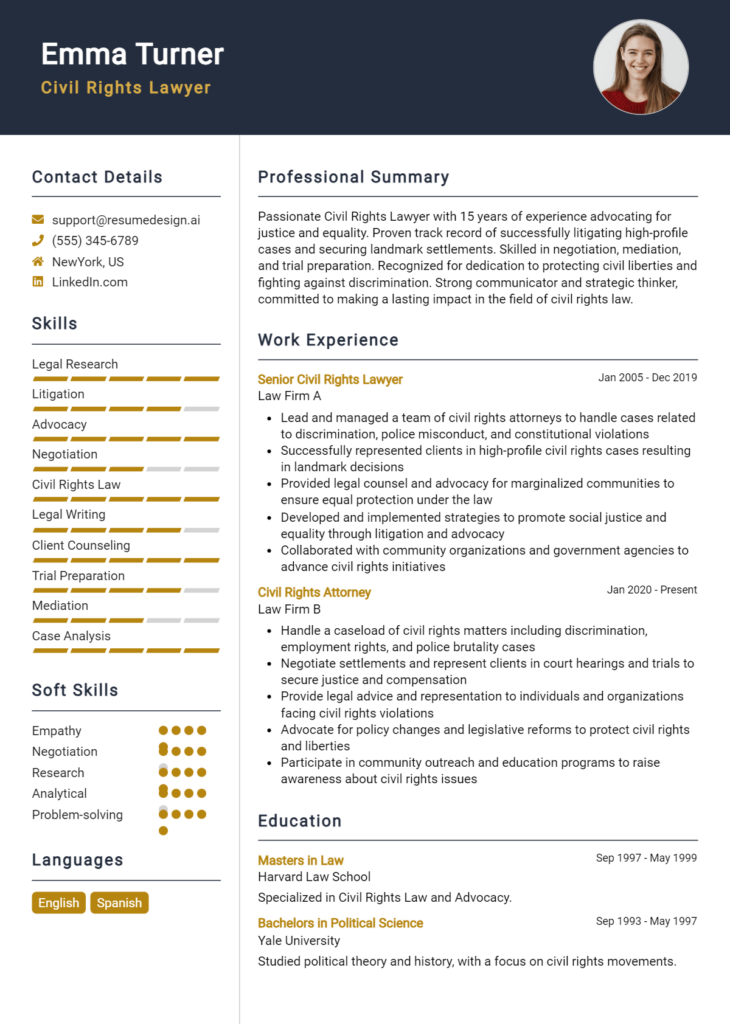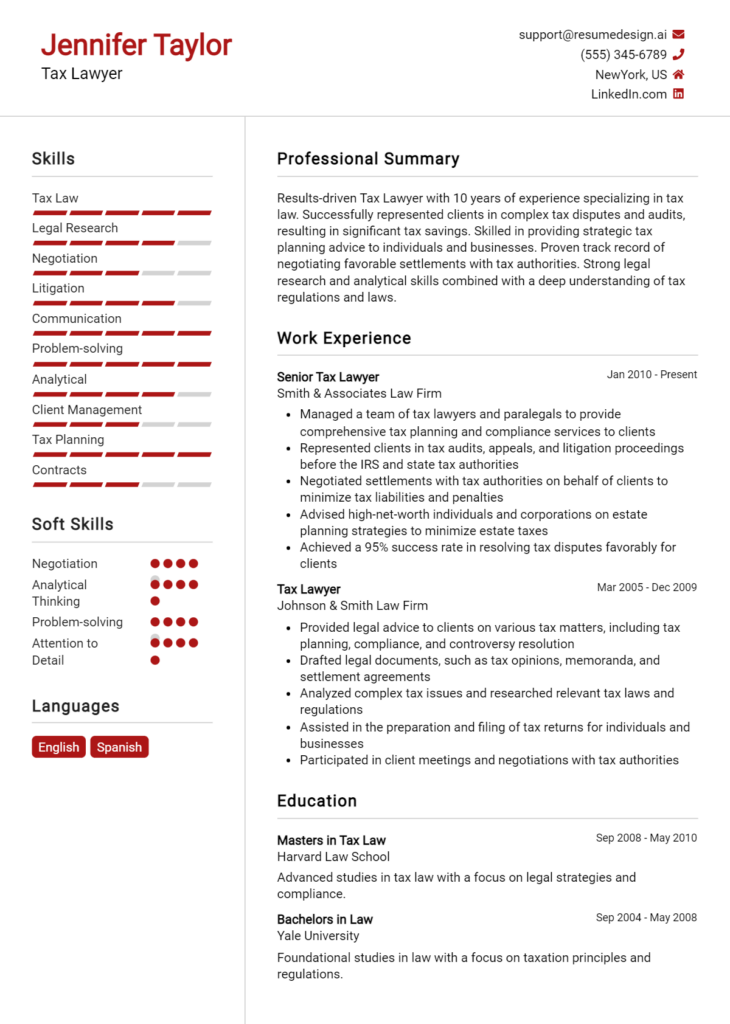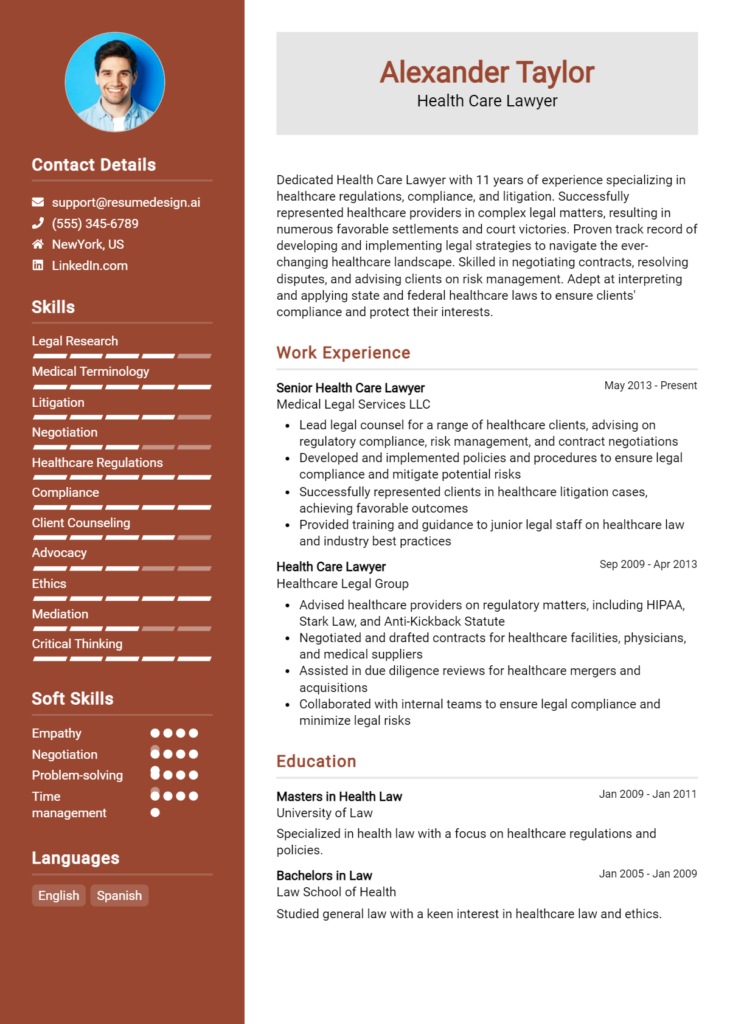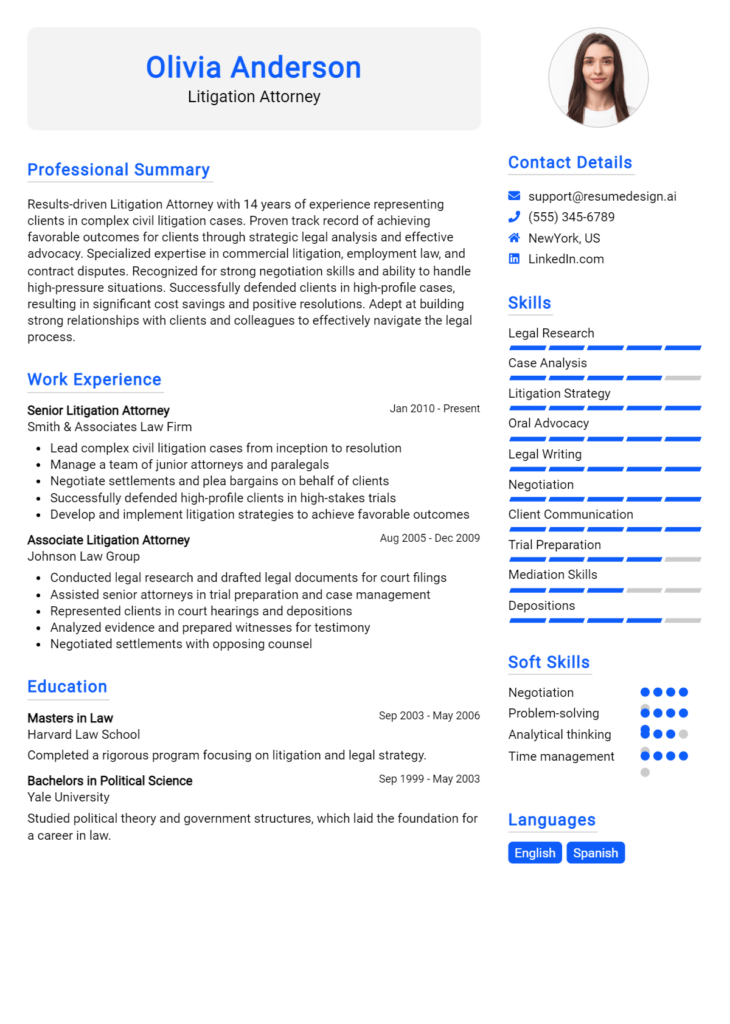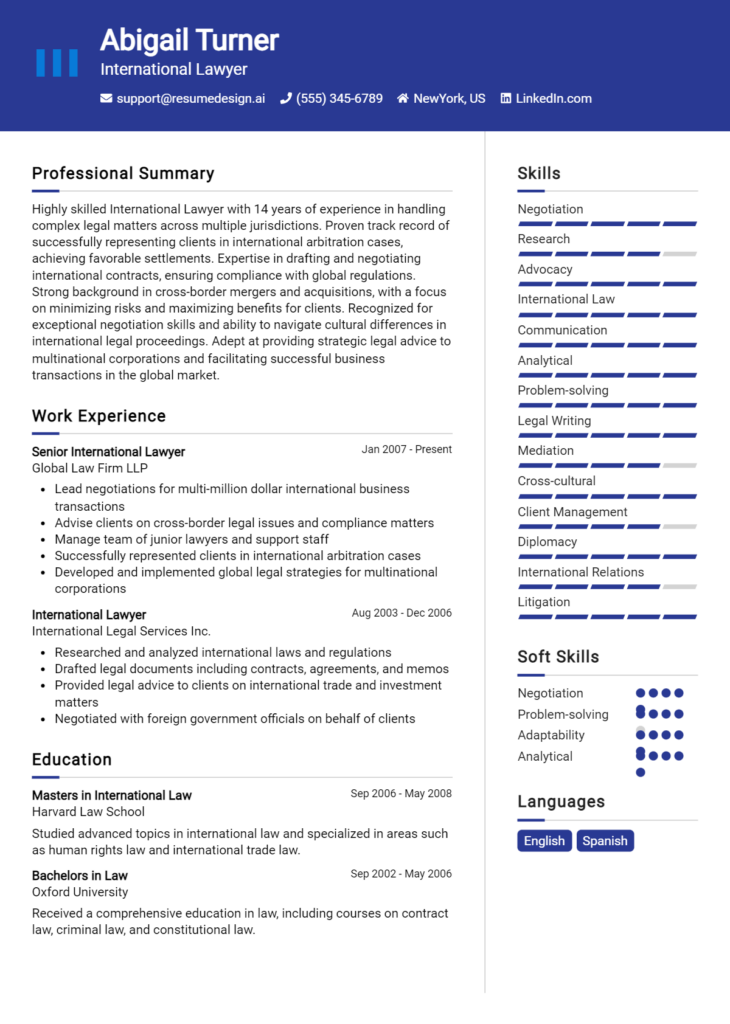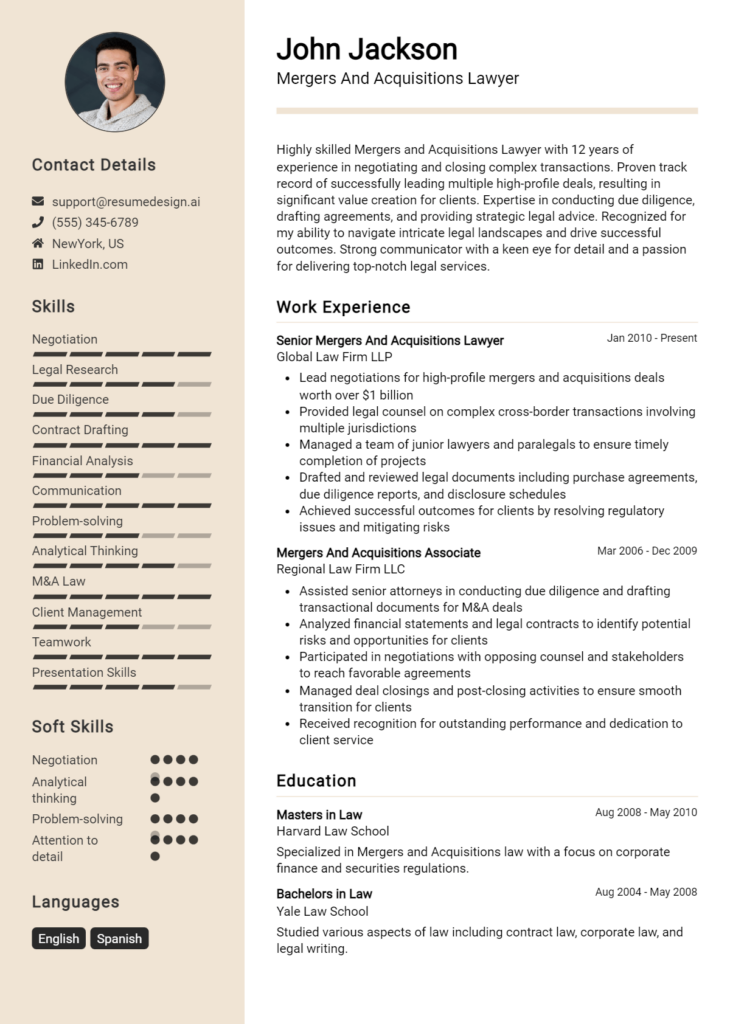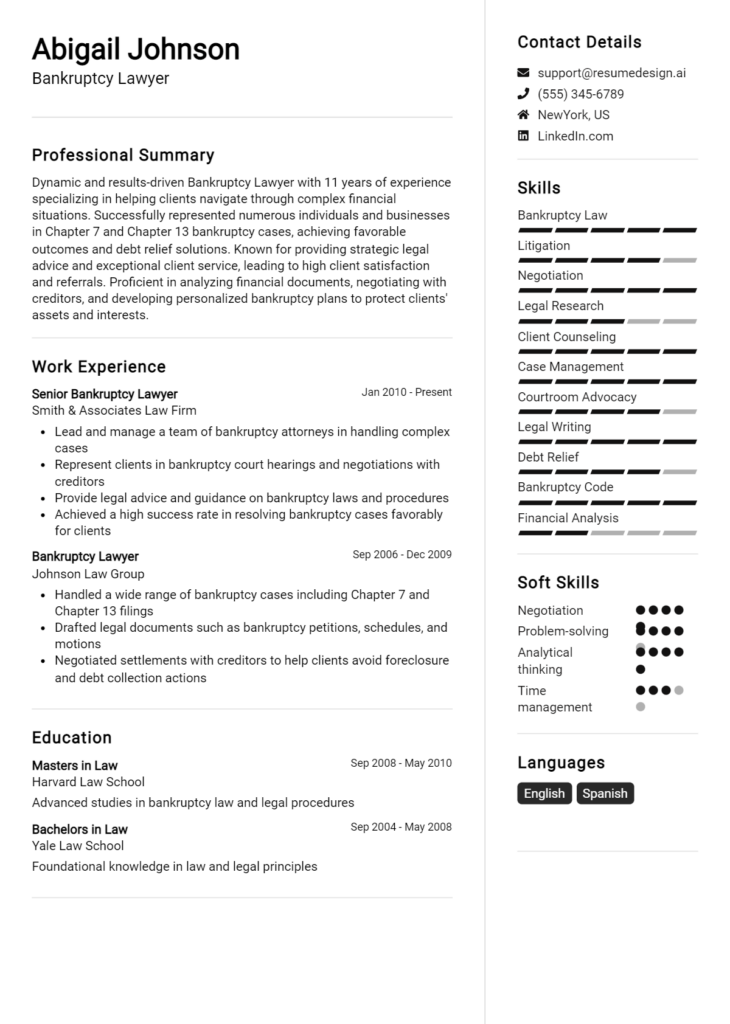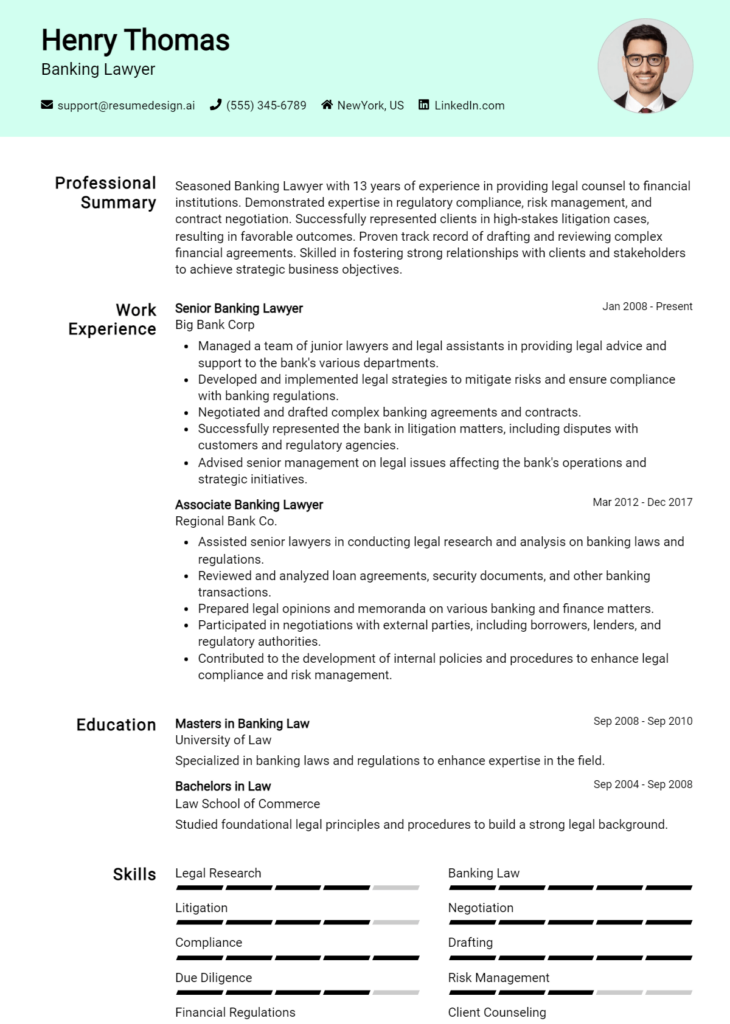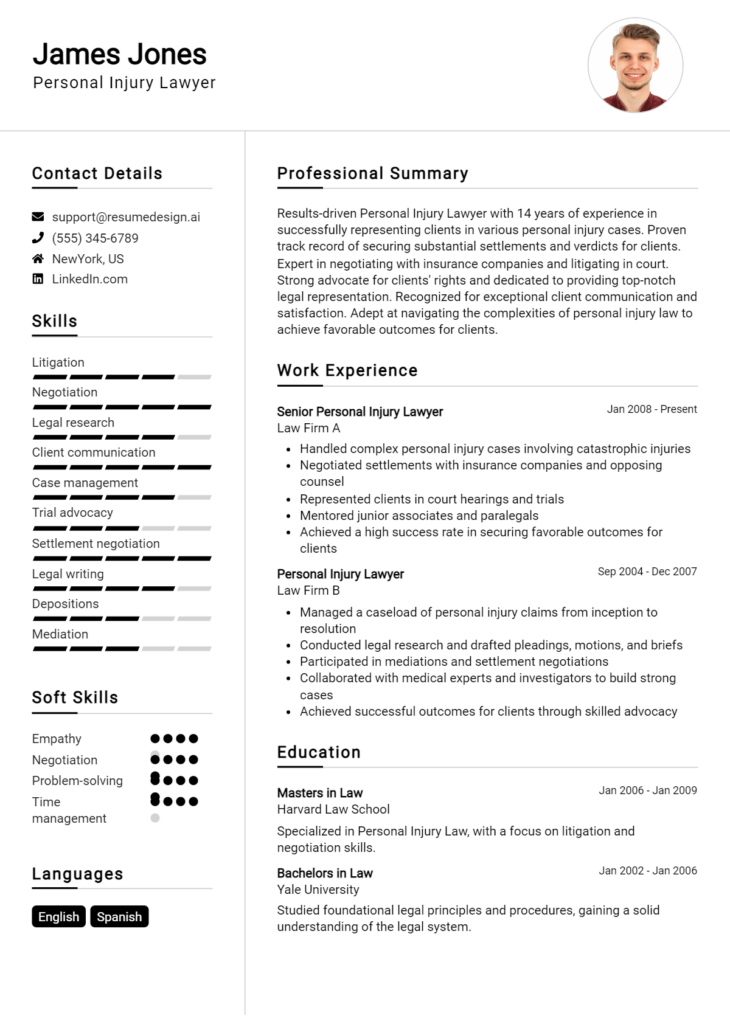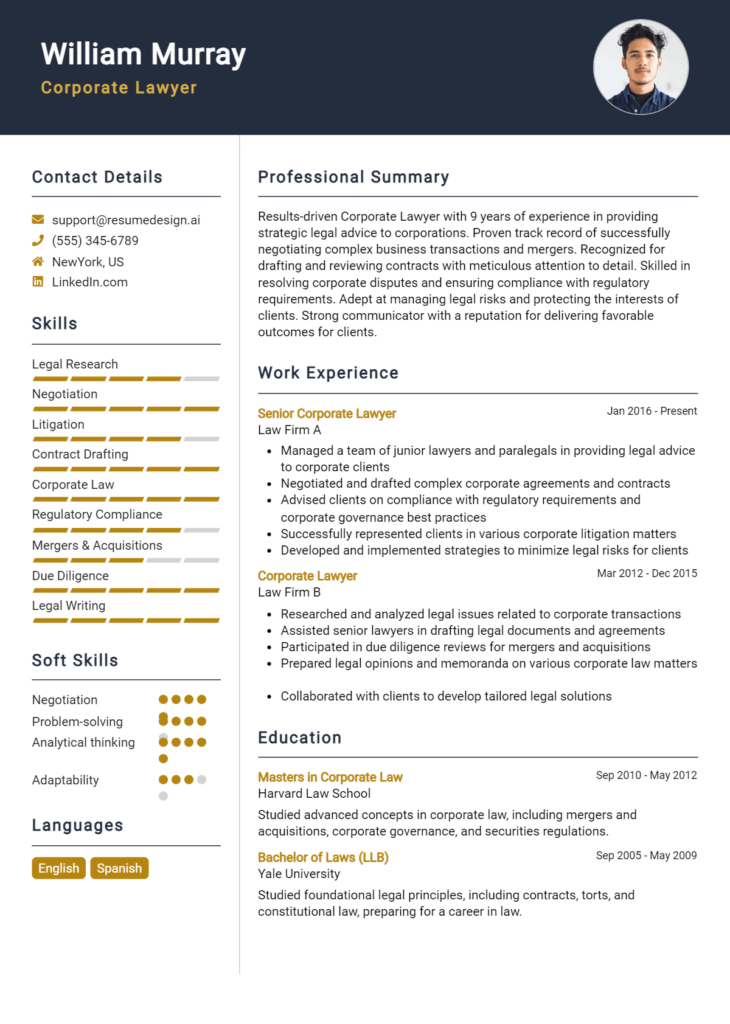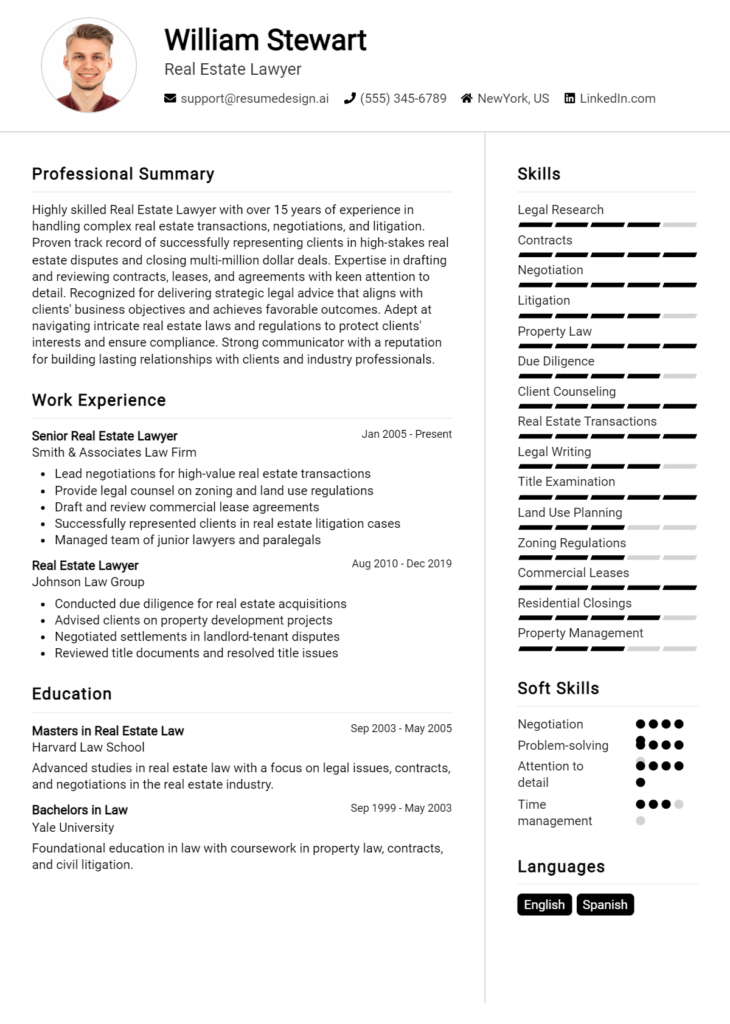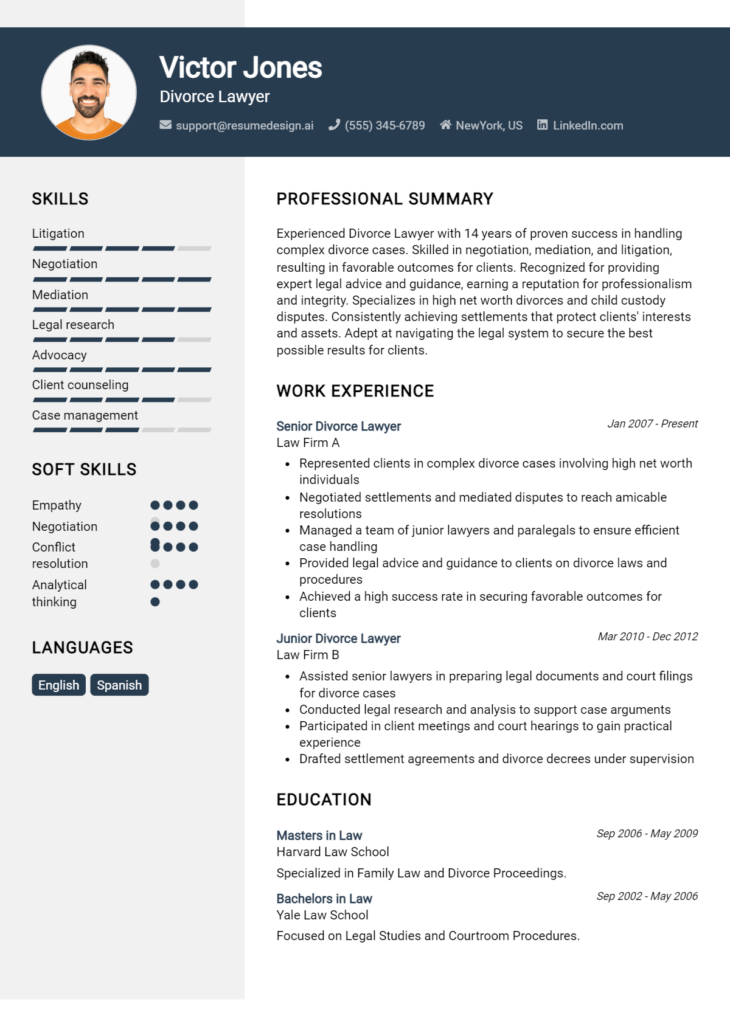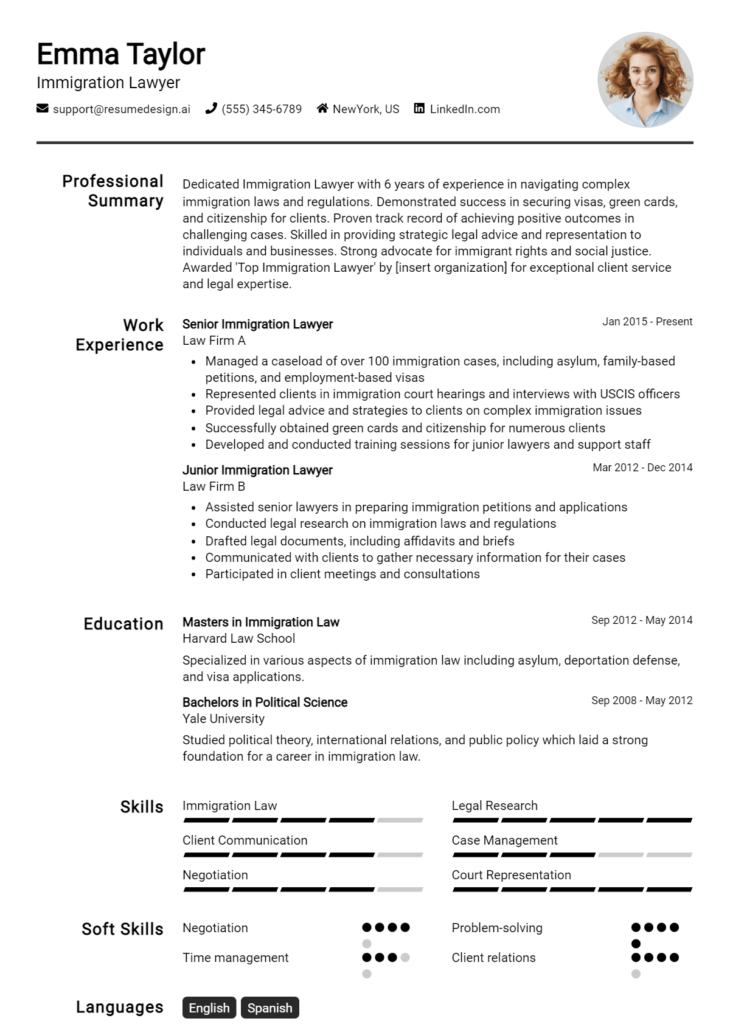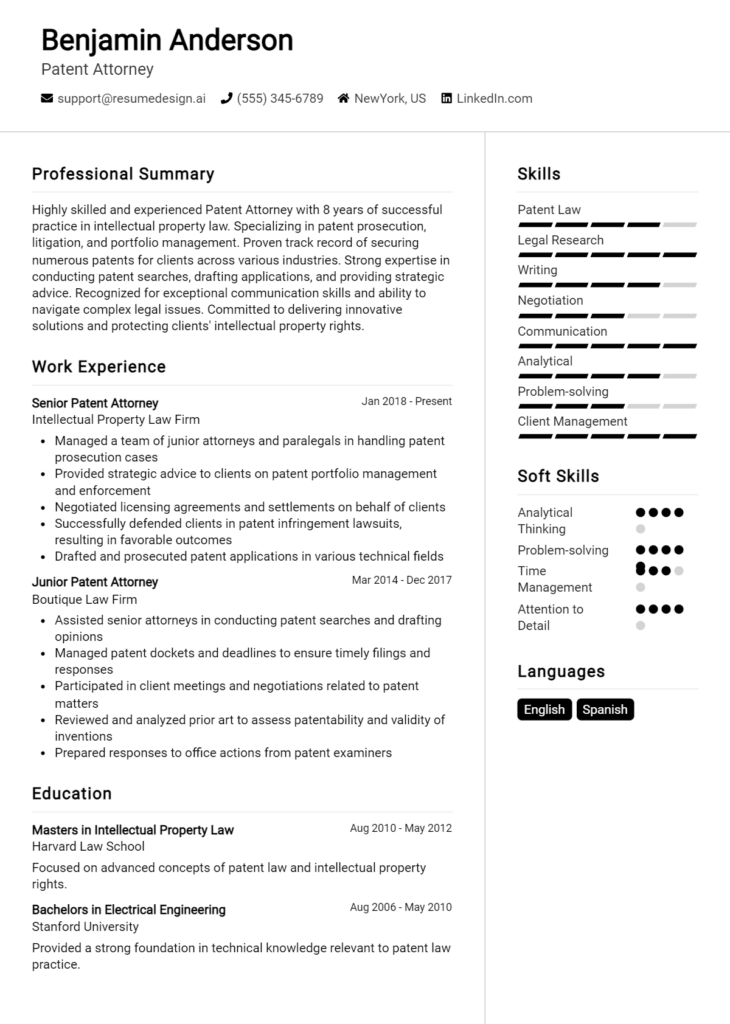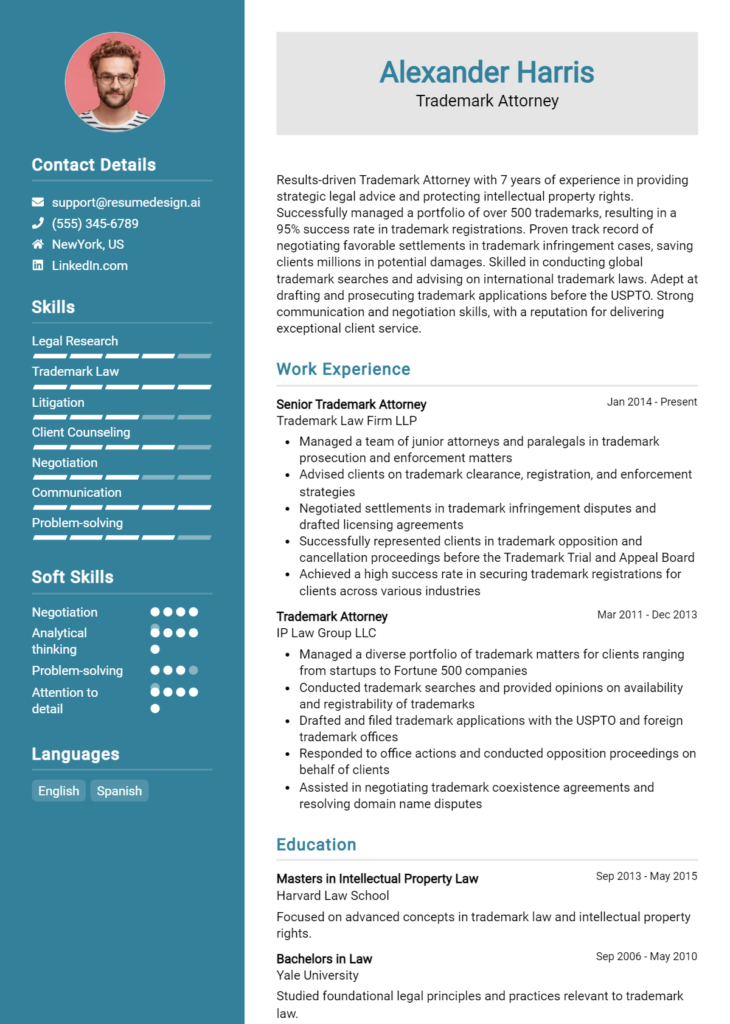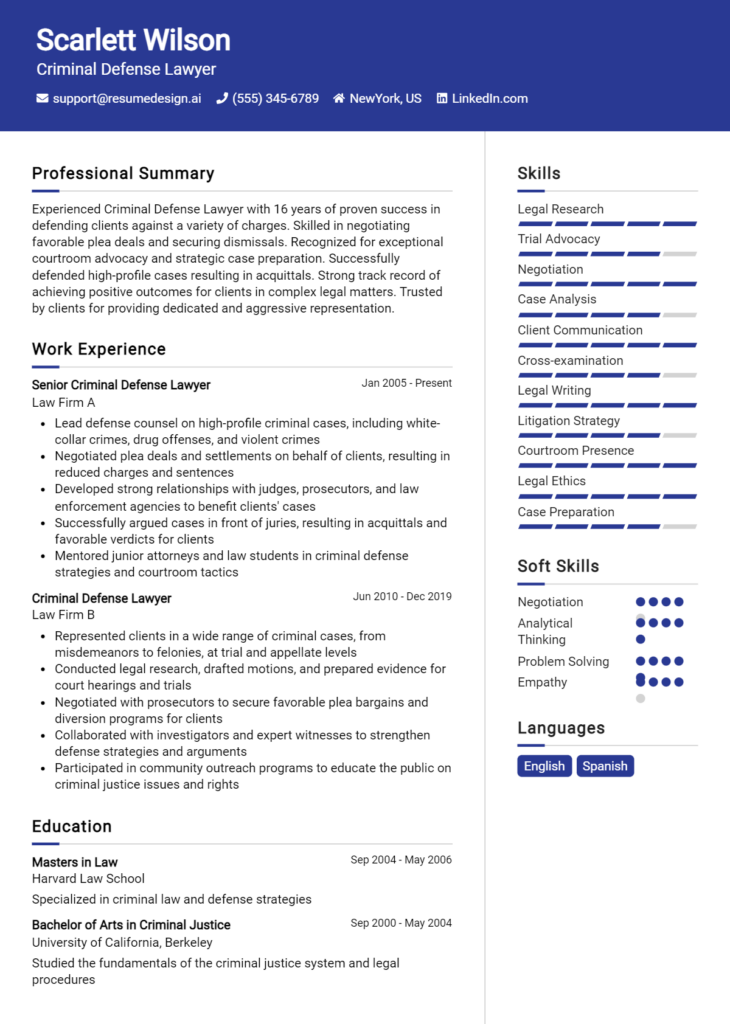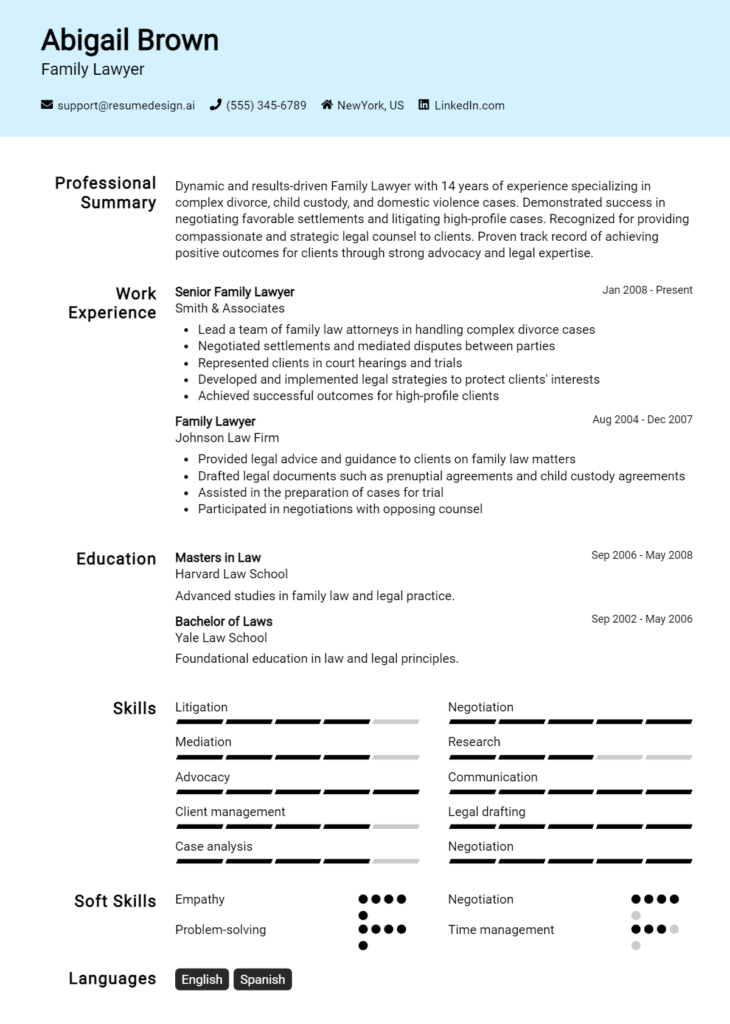Intellectual Property Lawyer Core Responsibilities
An Intellectual Property Lawyer is pivotal in safeguarding an organization's innovations and creative assets. Their core responsibilities include advising on IP strategies, conducting patent and trademark searches, and representing clients in disputes. Successful professionals possess strong technical knowledge, operational insight, and exceptional problem-solving skills. This role often bridges various departments, ensuring that legal frameworks align with business objectives. A well-structured resume can effectively showcase these qualifications, highlighting their contribution to the organization’s goals.
Common Responsibilities Listed on Intellectual Property Lawyer Resume
- Conducting legal research on intellectual property laws and regulations
- Drafting, reviewing, and filing patent and trademark applications
- Advising clients on IP strategy and portfolio management
- Representing clients in IP litigation and disputes
- Negotiating licensing agreements and contracts
- Monitoring and enforcing IP rights
- Conducting due diligence for mergers and acquisitions
- Providing training and guidance on IP issues to internal teams
- Staying updated on industry trends and changes in IP law
- Collaborating with R&D and marketing teams to protect innovations
- Preparing and presenting legal opinions on IP matters
- Managing IP portfolios and compliance issues
High-Level Resume Tips for Intellectual Property Lawyer Professionals
In the competitive landscape of legal professions, a well-crafted resume serves as a critical tool for Intellectual Property Lawyer professionals. It is often the first impression a potential employer receives, making it essential that this document not only reflects a candidate's skills and achievements but also showcases their unique qualifications in the field of intellectual property law. A strong resume can open doors to coveted positions, while a poorly constructed one can hinder even the most experienced professionals. This guide will provide practical and actionable resume tips specifically tailored for Intellectual Property Lawyer professionals, helping you to stand out in a crowded job market.
Top Resume Tips for Intellectual Property Lawyer Professionals
- Tailor your resume to the job description by emphasizing relevant experience and skills that align with the specific requirements of the position.
- Highlight your expertise in various areas of intellectual property law, such as patents, trademarks, copyrights, and trade secrets.
- Quantify achievements where possible, such as the number of successful cases handled or the value of assets protected.
- Include keywords from the job posting to pass through Applicant Tracking Systems (ATS) and catch the hiring manager’s attention.
- Showcase any relevant certifications or memberships in professional organizations related to intellectual property law.
- List your educational background prominently, particularly any specialized training or degrees related to intellectual property.
- Detail experience with intellectual property litigation, negotiations, and compliance, providing specific examples when possible.
- Incorporate client testimonials or endorsements that illustrate your competence and success in the field.
- Maintain a clean and professional layout, ensuring the resume is easy to read and visually appealing, free from clutter.
By implementing these tips, you can significantly enhance your chances of landing a position in the Intellectual Property Lawyer field. An optimized resume not only highlights your qualifications but also demonstrates your commitment to the profession, setting you apart from other candidates and increasing your appeal to potential employers.
Why Resume Headlines & Titles are Important for Intellectual Property Lawyer
In the competitive field of intellectual property law, a resume headline or title serves as an essential tool for candidates to capture the attention of hiring managers. A strong headline can create an immediate impact by summarizing a candidate's key qualifications in a concise and compelling manner. This brief yet powerful phrase can distinguish a candidate from others, providing a snapshot of their expertise and value proposition relevant to the position being applied for. Therefore, crafting an effective headline is crucial for making a memorable first impression that aligns with the specific demands of the intellectual property law sector.
Best Practices for Crafting Resume Headlines for Intellectual Property Lawyer
- Keep it concise: Aim for a headline that is no longer than a single sentence.
- Be role-specific: Tailor the headline to reflect the specific position you are applying for.
- Highlight key strengths: Include your most relevant skills, experience, or accolades.
- Use powerful language: Choose strong action verbs and impactful adjectives.
- Avoid jargon: Use clear language that is easily understood by hiring managers.
- Incorporate keywords: Use industry-relevant terms that match the job description.
- Make it engaging: Craft a headline that piques curiosity and invites further reading.
- Stay professional: Ensure the tone is appropriate for the legal field.
Example Resume Headlines for Intellectual Property Lawyer
Strong Resume Headlines
"Seasoned Intellectual Property Lawyer Specializing in Patent Law and Trademark Protection"
“Results-Driven IP Attorney with 10+ Years of Experience in Copyright Litigation”
“Dynamic Legal Professional Focused on Intellectual Property Strategy and Portfolio Management”
Weak Resume Headlines
“Lawyer Looking for Work”
“Experienced Professional in Legal Matters”
Strong headlines are effective because they directly communicate the candidate's expertise and area of specialization, making it easy for hiring managers to recognize their fit for the role. They use specific language and highlight relevant qualifications, which can immediately engage the reader. In contrast, weak headlines fail to impress as they lack specificity and do not convey any meaningful information about the candidate's skills or experience. This generic approach can make a candidate seem less qualified or memorable in a competitive job market.
Writing an Exceptional Intellectual Property Lawyer Resume Summary
A resume summary is a crucial component of an Intellectual Property Lawyer's application as it serves as an engaging introduction to the candidate's qualifications and expertise. This brief overview captures the attention of hiring managers by succinctly showcasing key skills, relevant experience, and notable accomplishments that align with the job role. An effective summary should be concise, impactful, and tailored to the specific position the candidate is applying for, ensuring that it resonates with the employer's needs and stands out in a competitive job market.
Best Practices for Writing an Intellectual Property Lawyer Resume Summary
- Quantify Achievements: Use specific numbers and outcomes to demonstrate the impact of your work.
- Focus on Skills: Highlight key legal skills, such as patent law, trademark registration, or litigation experience.
- Tailor the Summary: Customize your summary for each job application to align with the job description.
- Be Concise: Limit your summary to 3-5 sentences to maintain clarity and engagement.
- Use Strong Action Verbs: Start with dynamic verbs that convey your accomplishments and contributions effectively.
- Showcase Relevant Experience: Highlight the most pertinent roles and responsibilities that relate to intellectual property law.
- Incorporate Industry Language: Use terminology specific to intellectual property law to demonstrate familiarity and expertise.
- Emphasize Continuing Education: Mention any relevant certifications or ongoing education that bolster your qualifications.
Example Intellectual Property Lawyer Resume Summaries
Strong Resume Summaries
Detail-oriented Intellectual Property Lawyer with over 7 years of experience in patent law, successfully managing over 150 patent applications and securing a 95% approval rate. Proven track record in negotiating licensing agreements that generated $2 million in revenue for clients.
Results-driven attorney specializing in trademark law, with extensive experience in litigation and enforcement. Achieved a 90% success rate in trademark infringement cases and reduced client costs by 30% through strategic settlement negotiations.
Highly skilled Intellectual Property Lawyer with a strong background in copyright law and digital media. Led a team that successfully defended a high-profile copyright infringement case, resulting in a $5 million settlement for the client.
Weak Resume Summaries
Experienced lawyer looking for opportunities in intellectual property law. Good at handling legal matters and providing advice.
Intellectual Property Lawyer with knowledge of patents and trademarks. Seeking to contribute to a legal team.
The strong resume summaries are considered effective because they provide specific, quantifiable achievements and demonstrate direct relevance to the role of an Intellectual Property Lawyer. They highlight unique skills and experiences that set the candidate apart. In contrast, the weak summaries lack detail, specificity, and do not convey any measurable outcomes, making them appear generic and less compelling to potential employers.
Work Experience Section for Intellectual Property Lawyer Resume
The work experience section of an Intellectual Property Lawyer's resume is a critical component that provides a window into the candidate's professional journey, showcasing their technical skills, team management capabilities, and the quality of deliverables they produce. This section not only highlights the candidate's expertise in intellectual property law but also demonstrates their ability to achieve quantifiable results and align their experiences with industry standards. Effectively detailing accomplishments and responsibilities allows potential employers to gauge the candidate's suitability for the role and their potential contributions to the organization.
Best Practices for Intellectual Property Lawyer Work Experience
- Emphasize technical expertise in areas such as patent law, copyright, and trademark registration.
- Quantify achievements using metrics, such as successful cases won or patents secured.
- Highlight collaboration with cross-functional teams and clients to enhance project outcomes.
- Detail leadership roles undertaken, including managing junior attorneys and support staff.
- Use action verbs to convey decisiveness and initiative in your contributions.
- Align your experiences with industry standards and current trends in intellectual property law.
- Include relevant continuing education or certifications that bolster your qualifications.
- Tailor your work experience to the specific job description, focusing on relevant skills and accomplishments.
Example Work Experiences for Intellectual Property Lawyer
Strong Experiences
- Successfully secured 15 patents for innovative technology products, resulting in a 20% increase in client revenues.
- Led a team of 5 attorneys in a complex trademark litigation case, achieving a favorable settlement that saved the client over $1 million.
- Implemented a new IP management system that improved case tracking efficiency by 30%, significantly enhancing client satisfaction.
- Collaborated with R&D teams to evaluate patentability of new inventions, resulting in a 40% increase in patent filings year-over-year.
Weak Experiences
- Worked on various cases related to intellectual property law.
- Assisted in the preparation of legal documents for clients.
- Participated in meetings with clients and other attorneys.
- Helped in researching legal issues as needed.
The examples of strong experiences are considered impressive because they clearly articulate specific achievements and their impact, showcasing the candidate's technical leadership and collaborative efforts. In contrast, the weak experiences lack detail and quantifiable results, making it difficult for potential employers to assess the candidate's true capabilities and contributions in the field of intellectual property law.
Education and Certifications Section for Intellectual Property Lawyer Resume
The education and certifications section of an Intellectual Property Lawyer resume plays a crucial role in showcasing the candidate's academic achievements, specialized training, and commitment to continuous learning in the field of intellectual property law. This section not only highlights the educational background that forms the foundation of legal expertise but also emphasizes industry-relevant certifications that demonstrate proficiency and credibility. By including relevant coursework and specialized training, candidates can enhance their alignment with the job role, making a strong case for their qualifications and dedication to staying current in a constantly evolving legal landscape.
Best Practices for Intellectual Property Lawyer Education and Certifications
- Focus on relevant degrees such as JD, LLM in Intellectual Property, or a related field.
- Include recognized certifications like Registered Patent Attorney or Certified Licensing Professional.
- Highlight specialized coursework in patent law, copyright law, or trademark law.
- Detail any continuing legal education (CLE) credits related to intellectual property.
- Emphasize advanced degrees or fellowships that enhance legal knowledge and expertise.
- List memberships in professional organizations like the American Intellectual Property Law Association (AIPLA).
- Be specific about achievements, such as honors or scholarships received in relevant studies.
- Avoid including irrelevant or outdated qualifications that do not pertain to the role.
Example Education and Certifications for Intellectual Property Lawyer
Strong Examples
- Juris Doctor (JD) from Harvard Law School, specializing in Intellectual Property Law.
- Master of Laws (LLM) in Intellectual Property Law from New York University School of Law.
- Registered Patent Attorney, United States Patent and Trademark Office (USPTO).
- Certification in Intellectual Property Management from the International Association for the Protection of Intellectual Property (AIPPI).
Weak Examples
- Bachelor of Arts in History, University of California, Berkeley.
- Certification in General Business Law, issued in 2005.
- Diploma in Paralegal Studies, not focused on Intellectual Property.
- Outdated certification in Copyright Law from a non-recognized institution.
The examples provided are considered strong because they directly relate to the field of intellectual property law, demonstrating both advanced education and relevant certifications that showcase expertise in the area. In contrast, the weak examples highlight qualifications that are either irrelevant to the role or outdated, which may detract from the candidate's credibility and relevance in the competitive landscape of intellectual property law.
Top Skills & Keywords for Intellectual Property Lawyer Resume
As an Intellectual Property Lawyer, possessing the right skills is crucial for standing out in a competitive job market. A well-crafted resume that highlights both hard and soft skills can significantly enhance your chances of landing an interview. Employers look for candidates who demonstrate a strong understanding of intellectual property law, as well as interpersonal skills that facilitate effective communication with clients and colleagues. By focusing on the relevant skills in your resume, you can showcase your expertise and ability to navigate complex legal issues, making you a valuable asset to any legal team.
Top Hard & Soft Skills for Intellectual Property Lawyer
Soft Skills
- Strong communication
- Negotiation skills
- Analytical thinking
- Attention to detail
- Problem-solving
- Client relationship management
- Time management
- Adaptability
- Ethical judgment
- Team collaboration
Hard Skills
- Knowledge of patent law
- Trademark registration processes
- Copyright law expertise
- Licensing agreements
- Litigation experience
- Research and writing
- Intellectual property audits
- Regulatory compliance
- Intellectual property valuation
- Contract drafting
By emphasizing these skills on your resume, you can effectively demonstrate your qualifications to potential employers. Additionally, highlighting your work experience in the field will further support your candidacy as a well-rounded Intellectual Property Lawyer.
Stand Out with a Winning Intellectual Property Lawyer Cover Letter
Dear [Hiring Manager's Name],
I am writing to express my interest in the Intellectual Property Lawyer position at [Company Name] as advertised on [Where You Found the Job Posting]. With a Juris Doctor from [Your Law School] and over [X years] of experience in intellectual property law, I am confident in my ability to contribute effectively to your legal team. My extensive background in trademark registration, copyright protection, and patent litigation has equipped me with the skills necessary to navigate complex legal landscapes and help clients safeguard their innovations and creations.
In my previous role at [Previous Company Name], I successfully managed a diverse portfolio of intellectual property cases, ensuring compliance with both domestic and international regulations. My proactive approach resulted in securing over [X number] of trademarks for clients, significantly enhancing their market presence. Additionally, I have represented clients in high-stakes litigation, where my strategic thinking and meticulous attention to detail led to favorable outcomes. I am adept at conducting thorough legal research and drafting precise legal documents, which I believe will be invaluable in delivering exceptional service at [Company Name].
I am particularly drawn to [Company Name] because of your commitment to innovation and excellence in the field of intellectual property law. I am eager to leverage my expertise in advising clients on IP strategies that align with their business objectives while protecting their creative assets. I thrive in collaborative environments and look forward to bringing my strong communication skills and passion for intellectual property law to your esteemed firm.
Thank you for considering my application. I am excited about the opportunity to contribute to [Company Name] and help clients navigate the complexities of intellectual property law. I look forward to discussing how my experiences and vision align with the goals of your team. Please feel free to contact me at [Your Phone Number] or [Your Email Address] to schedule a conversation.
Sincerely,
[Your Name]
[Your Address]
[City, State, Zip]
Common Mistakes to Avoid in a Intellectual Property Lawyer Resume
When crafting a resume for the role of an Intellectual Property Lawyer, it's crucial to avoid common pitfalls that can undermine your qualifications and experience. A well-structured resume should effectively highlight your expertise, but many candidates make mistakes that detract from their professional image. Here are some common mistakes to be aware of:
Generic Objective Statements: Using vague or generic objective statements fails to capture the attention of hiring managers. Tailor your objective to reflect your specific interest in intellectual property law and the value you can bring to the firm.
Overloading with Legal Jargon: While legal terminology is important, excessive jargon can make your resume difficult to read. Strive for clarity and simplicity to ensure that both legal and non-legal readers can understand your qualifications.
Neglecting Relevant Experience: Focusing too much on unrelated work experiences can dilute your resume. Prioritize and expand on experiences directly related to intellectual property law, such as previous roles in patent law, trademark law, or copyright issues.
Omitting Achievements: Simply listing job responsibilities without including achievements can make your resume bland. Highlight specific accomplishments, such as successful cases, patents obtained, or contributions to major projects, to demonstrate your impact.
Inconsistent Formatting: A disorganized or inconsistent format can distract from your content. Use uniform headings, bullet points, and font styles to create a polished and professional appearance.
Ignoring Keywords: Many firms use applicant tracking systems that screen resumes for specific keywords. Failing to incorporate relevant keywords related to intellectual property law can result in your resume being overlooked.
Grammatical Errors and Typos: Attention to detail is paramount in law. Spelling mistakes and grammatical errors can portray a lack of professionalism and care. Proofread your resume multiple times and consider having someone else review it as well.
Listing Irrelevant Skills: Including skills that are not relevant to the role can dilute your qualifications. Focus on skills that directly relate to intellectual property law, such as negotiation, litigation, and research abilities, to make your resume more compelling.
Conclusion
As an Intellectual Property Lawyer, your expertise in protecting clients' intellectual assets is invaluable. In this article, we explored the various responsibilities that come with this role, including advising on copyright, trademark, and patent issues, as well as representing clients in legal disputes. We also discussed the importance of staying updated with evolving laws and regulations in the intellectual property landscape.
In summary, the key points covered include:
- Understanding the different types of intellectual property rights and their significance.
- The role of an Intellectual Property Lawyer in drafting and reviewing contracts.
- The necessity of conducting thorough research to ensure clients' innovations are protected.
- Strategies for effective negotiation and litigation in IP cases.
With these insights in mind, it's essential to ensure that your resume reflects your qualifications and experiences accurately. Take a moment to review your Intellectual Property Lawyer Resume to ensure it aligns with the skills and expertise highlighted in this article.
To assist you in this process, consider utilizing the following resources:
- Explore resume templates to find a design that suits your style.
- Use the resume builder for an easy, guided approach to creating a professional resume.
- Check out resume examples for inspiration on how to present your qualifications effectively.
- Don’t forget to craft a compelling introduction with cover letter templates that can set you apart from the competition.
Take action today to refine your resume and position yourself for success in your career as an Intellectual Property Lawyer!

